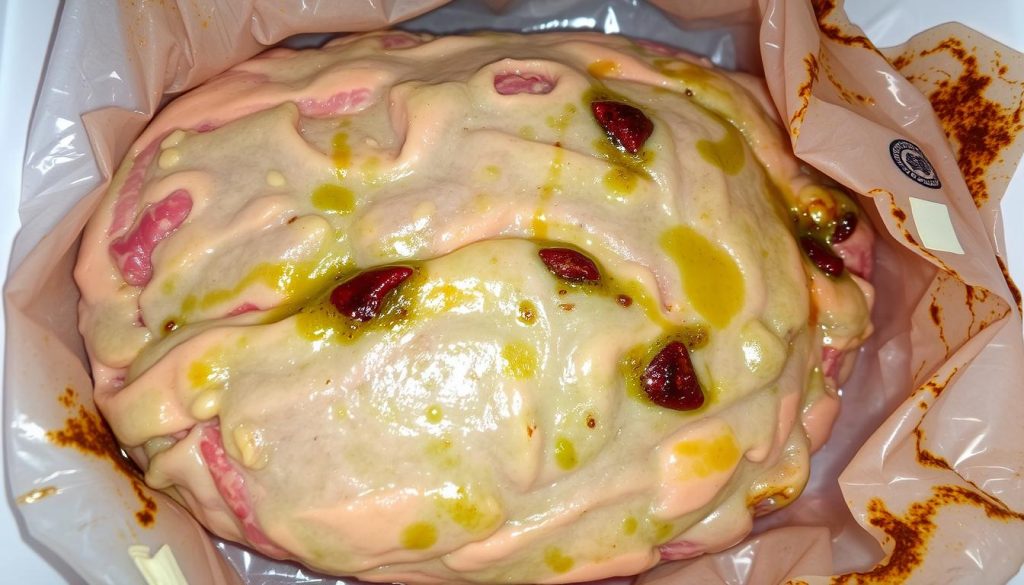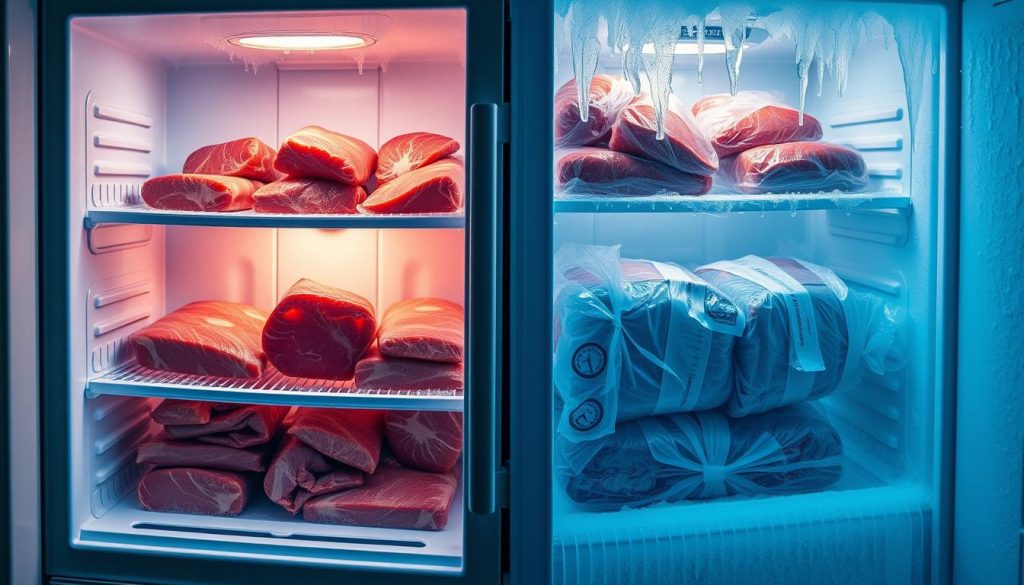Proper venison storage is vital for enjoying wild game meat. Good refrigeration and safety practices keep this lean protein fresh. Let’s explore venison’s fridge life and how to keep it safe to eat.
Knowing venison’s shelf life is crucial for hunters and wild game fans. We’ll cover storage basics and spoilage signs. This ensures you can enjoy every bite of your harvest.
Key Takeaways
- Proper venison storage extends shelf life
- Refrigeration temperature affects meat quality
- Packaging methods impact freshness
- Different cuts have varying storage times
- Recognizing spoilage signs ensures food safety
- Freezing offers long-term storage options
- Safe handling prevents contamination
Understanding Venison Storage Basics
Proper venison storage keeps meat fresh and safe. Let’s explore how to maintain your wild game’s quality and taste.
What Affects Venison Freshness
Air, temperature changes, and bacteria impact venison freshness. Quick cooling and clean processing are vital. Proper handling from field to fridge keeps meat quality high.
Optimal Temperature Settings
Set your fridge between 32°F and 40°F for venison. This slows bacteria growth without freezing the meat. Use a thermometer to check fridge temperature often.
| Temperature Range | Effect on Venison |
|---|---|
| Below 32°F | Meat may freeze, affecting texture |
| 32°F – 40°F | Optimal for freshness and safety |
| Above 40°F | Bacterial growth accelerates |
Importance of Proper Packaging
Good packaging keeps venison fresh. Vacuum-sealed bags are best, removing air that causes freezer burn. No vacuum sealer? Use plastic wrap, then foil.
“Proper packaging extends venison’s shelf life and preserves its rich, gamey flavor.”
Master these storage basics for fresh, tasty venison. Control temperature, limit air exposure, and use proper packaging methods.
How Long Does Venison Last in the Fridge
Knowing venison shelf life is key for safe eating and best taste. Let’s explore storage times for different venison types. This info will help you enjoy your game meat fully.
Raw Ground Venison Storage Time
Ground venison is handy but spoils faster due to more surface area. Keep it in the fridge for up to 2 days. Freeze it quickly if you can’t use it soon.
Fresh Venison Cuts Shelf Life
Whole venison cuts last longer than ground meat. Store fresh cuts in the fridge for 3 to 5 days. Big roasts may last a week if wrapped well and kept cool.
Cooked Venison Duration
Cooked venison stays good in the fridge for 3 to 4 days. Cool it fast and use airtight containers. This stops bacteria growth and keeps it tasty.
| Venison Type | Refrigerator Storage Time | Freezer Storage Time |
|---|---|---|
| Raw Ground Venison | 1-2 days | 3-4 months |
| Fresh Venison Cuts | 3-5 days | 6-8 months |
| Cooked Venison | 3-4 days | 2-3 months |
These times are just guides. Always check for bad signs before eating stored venison. Do this no matter how long it’s been in the fridge.
Proper Packaging Methods for Venison
Picking the right packaging for venison keeps it tasty and fresh. We’ve tried different ways to help you store your game meat well.
Vacuum sealing is a top pick for keeping venison fresh. It removes air, stopping freezer burn and making meat last longer. This method works great for storing meat for months.
Butcher paper lets meat breathe while guarding against moisture. It’s good for short-term fridge storage and big venison cuts.
Freezer bags are easy and cheap to use. Double-bagging helps stop freezer burn and smell transfer. Push out as much air as you can before closing.
Airtight containers work well for cooked venison or small portions. They stack nicely in the fridge and keep smells in check.
| Packaging Method | Best For | Storage Time |
|---|---|---|
| Vacuum Sealing | Long-term freezer storage | 6-12 months |
| Butcher Paper | Short-term refrigeration | 3-5 days |
| Freezer Bags | Freezer storage | 3-6 months |
| Airtight Containers | Cooked venison, refrigeration | 3-4 days |
Good packaging is just one step in storing venison well. Use these methods with the right temperature and handling for best results.
Signs of Spoiled Venison
Spotting spoiled meat is vital for food safety. We’ll show you how to identify unsafe venison. These signs help prevent illness and ensure you enjoy your game meat.
Visual Indicators
Check venison for unusual discoloration or slimy texture. Spoiled meat often turns greenish or grayish. Fuzzy growths or mold mean the meat is bad and should be thrown away.

Smell and Texture Changes
Fresh venison has a mild, gamey scent. Sour, rancid, or off odors suggest spoilage. Spoiled venison may feel sticky or tacky, unlike fresh meat’s firm texture.
Color Variations to Watch For
Meat discoloration signals spoilage. Fresh venison is dark red, but spoiled meat may change color:
| Color | Indication |
|---|---|
| Brown or gray | Early stages of spoilage |
| Green or blue | Advanced spoilage, unsafe to eat |
| White or pink spots | Possible mold growth |
Trust your senses to identify spoiled meat. If unsure about your venison’s safety, it’s best to throw it out. Proper storage and handling are key to preventing meat spoilage.
Best Practices for Refrigerating Venison
Proper venison storage is crucial for maintaining quality. Here are essential tips to help you keep your venison fresh. These methods will ensure your meat stays flavorful and ready for cooking.
Temperature Control Tips
Set your fridge between 34°F and 38°F. Use a thermometer to check temperatures often. Store venison on the bottom shelf where it’s coldest.
This placement helps prevent drips and cross-contamination. Proper fridge organization is key to preserving venison quality.
Container Selection
Choose airtight, shallow containers for quick cooling. Glass or food-grade plastic works well. Vacuum-sealed bags are great for longer storage.
Label containers with the date to track freshness. The right containers are crucial for food preservation.
Air Exposure Prevention
Wrap cuts tightly in plastic wrap or butcher paper. For ground venison, press out excess air before sealing. Consider using a vacuum sealer for best results.
This extra step can extend shelf life significantly. Minimizing air contact is vital for venison freshness.
- Check seals on containers regularly
- Use smaller portions to reduce air exposure when opening
- Double-wrap if needed for extra protection
These guidelines will keep your venison fresh and flavorful. Proper storage is key to creating delicious venison dishes. Enjoy your well-preserved meat in your next meal!
Freezing vs. Refrigeration for Venison
Freezing and refrigeration are the main options for storing venison. Each method offers unique benefits for preserving this lean meat. Let’s explore these approaches to help you make the best choice.

Refrigeration works best for short-term storage. Fresh venison stays good for 3-5 days at 40°F or below. This method keeps the meat’s texture and flavor intact for quick use.
Freezing is perfect for long-term storage. Properly frozen venison can last up to 12 months without losing quality. Wrap the meat tightly or vacuum-seal it to prevent freezer burn.
| Storage Method | Duration | Best For |
|---|---|---|
| Refrigeration | 3-5 days | Immediate use |
| Freezing | Up to 12 months | Long-term preservation |
Thawing methods play a key role in keeping meat quality high. We suggest thawing frozen venison in the refrigerator. This slow process maintains texture and stops bacteria growth.
For faster results, use cold water thawing. Remember to change the water every 30 minutes.
“Proper freezing and thawing techniques are essential for preserving venison’s rich flavor and tender texture.”
Both refrigeration and freezing can keep your venison fresh. Proper handling ensures your meat stays delicious for your next meal.
Safe Handling and Storage Techniques
Proper handling and storage of venison are vital for food safety. Let’s explore key techniques to keep your wild game meat fresh and safe.
Initial Processing Guidelines
Cleanliness is crucial when processing meat. Wash your hands and sanitize all surfaces and tools thoroughly. Cut venison into manageable pieces, removing dirt or debris.
Trim visible fat to reduce the “gamey” taste and improve flavor. This step enhances the overall quality of your venison.
Cross-contamination Prevention
Keep raw venison separate from other foods to maintain hygiene. Use dedicated cutting boards and utensils for raw meat. Clean all surfaces with hot, soapy water after processing.
Sanitize tools and work areas to prevent bacterial growth. This step is crucial for food safety.
Kitchen Safety Measures
Kitchen sanitation is essential when handling venison. Wash your hands often, especially after touching raw meat. Use separate containers for raw and cooked venison.
Cook venison to an internal temperature of 165°F (74°C). This temperature kills harmful bacteria and ensures safe consumption.
| Safety Measure | Importance | Implementation |
|---|---|---|
| Hand washing | Prevents bacterial spread | Wash for 20 seconds with soap and warm water |
| Surface cleaning | Eliminates contamination | Use food-safe sanitizer after washing |
| Temperature control | Inhibits bacterial growth | Keep raw venison below 40°F (4°C) |
These guidelines ensure your venison stays safe and tasty. From field to table, proper handling makes all the difference.
Conclusion
Proper venison storage is crucial for keeping wild game fresh and safe. Refrigerate raw ground venison for up to two days. Store fresh cuts for three to five days in the fridge.
Use airtight containers or vacuum-sealed bags to protect your venison. This prevents air exposure and cross-contamination. Always check for spoilage signs before cooking.
These guidelines ensure the best flavor and quality from your venison. Each step, from processing to kitchen safety, matters. Follow these tips to enjoy your harvest fully.




